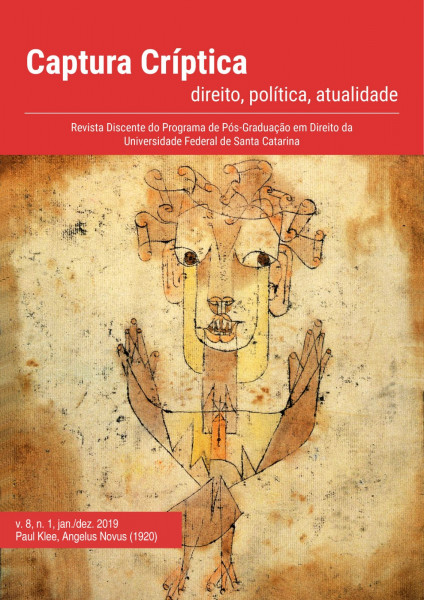O instituto jurídico da plea bargaining e o projeto de lei anticrime: o anseio punitivista e a violação do art. 5º, inciso LXI, da Constituição Federal
Palavras-chave:
Direito Penal, Política, ConstituiçãoResumo
A presente pesquisa procura analisar de forma crítica o processo de expansão dos mecanismos processuais negociais dentro da justiça criminal brasileira. Para tanto, o artigo busca realizar uma análise do instituto jurídico da plea bargaining, também conhecido como instituto da barganha, e a sua relação com o Projeto de Lei Anticrime proposto pelo Ministro da Justiça Sérgio Moro. Assim, considerando-se a origem, a história e o desenvolvimento do instituto supramencionado, procura-se apontar a viabilidade jurídica de sua aplicação no ordenamento pátrio. Por fim, busca-se compreender como as propostas inseridas no Projeto de Lei Anticrime, claramente movidas por um ideal punitivista, poderiam representar uma violação ao art. 5º, inciso LXI, da Constituição Federal.Referências
ANITUA, Gabriel Ignacio. La importación de mecanismos consensuales del proceso
estadounidense en las reformas procesales iberoamericanas. Revista General de
Derecho.Procesal, n. 6, p. 01-23, março/2005. Disponível em:
. Acesso em: 22 jun. 2019.
ALSCHULER, Albert. Plea bargaining and its history. Chicago: University of Chicago Law School. p. 1-43. 1979. Disponível em: <https://chicagounbound.uchicago.edu/cgi/viewcontent.cgi?article=2005&context=journal_ar ticles>. Acesso em 10 mar. 2019.
ANDRADE, Fábio da Silva. A ampliação dos espaços de consenso no processo penal. Disponível em: < http://www.bibliotecadigital.ufmg.br/dspace/bitstream/handle/1843/BUOS- ASNFB5/disserta__o___final___pdf.pdf?sequence=1> Acesso em 23 de jun. 2019.
BRASIL. Constituição da República Federativa do Brasil de 1988. Disponível em: <http://www.planalto.gov.br/ccivil_03/constituicao/constituicao.htm>. Acesso em 18 de jun. 2019.
BRASIL. Lei 9.099/95, 26 de setembro de 1995. Brasília. Disponível em: < http://www.planalto.gov.br/ccivil_03/leis/l9099.htm>. Acesso em 18 de jun. 2019.
BRASIL. Ministério da Justiça e Segurança Pública. BNMP 2.0 revela o perfil da população carcerária brasileira. Disponível em: <http://www.cnj.jus.br/noticias/cnj/87316- bnmp-2-0-revela-o-perfil-da-populacao-carceraria-brasileira>. Acesso em: 22 maio de 2019.
BRASIL. Ministério da Justiça e Segurança Pública. Há 726.712 pessoas presas no Brasil. Disponível em: <https://www.justica.gov.br/news/ha-726-712-pessoas-presas-no-brasil>. Acesso em: 20 de jun. 2019.
BRASIL. Ministério da Justiça e Segurança Pública. Projeto de Lei Anticrime. Disponível em: <https://www.justica.gov.br/news/collective-nitf-content-1549284631.06/projeto-de-lei- anticrime.pdf>. Acesso em 23 de mar. 2019
CAMPOS, Gabriel Silveira de Queirós. Plea Bargaining e Justiça Criminal Consensual: entre os ideais de funcionalidade e garantismo. Revista Custos Legis, v. 4, p. 1-26, 2012.
CAPELA, Fábio. Plea bargaining: o projeto de “negociata penal” de Sérgio Moro. Disponível em: <http://www.justificando.com/2019/05/29/plea-bargaining-o-projeto-de- negociata-penal-de-sergio-moro/> Acesso em: 30 mai. 2019.
FERRAJOLI, Luigi. Direito e razão: teoria do garantismo penal. 3 ed. São Paulo: Revista dos Tribunais, 2010.
GIACOMOLLI, Nereu José; GOMES DE VASCONCELLOS, Vinicius. Justiça Criminal Negocial: Crítica À Fragilização Da Jurisdição Penal Em Um Cenário De Expansão Dos Espaços De Consenso No Processo Penal. Novos Estudos Jurídicos, v. 20, n. 3, p. 1121, dez. 2015. Disponível em: <https://www6.univali.br/seer/index.php/nej/article/view/8392>. Acesso em: 17 jun. 2019.
GOMES DE VASCONCELLOS, Vinicius; MOELLER, Uriel. Acordos no processo penal alemão: descrição do avanço da barganha da informalidade à regulamentação normativa. Bol. Mex. Der. Comp., México, v. 49, n. 147, p. 13-33, dez. 2016. Disponível em: <http://www.scielo.org.mx/scielo.php?script=sci_arttext&pid=S004186332016000300013&l ng=es&nrm=iso>. Acesso em: 09 jul. 2019.
ISMAEL, André Gomes; RIBEIRO, Diaulas Costa; AGUIAR, Julio Cesar de. Plea bargaining: aproximação conceitual e breve histórico. Revista de Processo, vol. 263, p. 429 – 449, 2017.
LOPES JUNIOR, Aury. Fundamentos do processo penal: Introdução crítica. 3. ed. São Paulo: Saraiva, 2017.
MOREIRA, José Carlos Barbosa. O Processo Penal Norte-Americano e sua Influência. Revista de Processo. vol. 103, p. 95-107, Jul/2001. Disponível em: <http://www.idclb.com.br/revistas/19/revista19%20(18).pdf>.
OLCHANOWSKI, Nicolai. Plea Bargaining: análise desde a filosofia da pena. Dissertação (mestrado) - Universidade Federal do Paraná, Setor de Ciências Jurídicas, Programa de Pós- Graduação em Direito. Disponível em: <https://acervodigital.ufpr.br/bitstream/handle/1884/47597/R%20-%20D%20- %20NIKOLAI%20OLCHANOWSKI.pdf?sequence=1&isAllowed=y>.
SILVA, José Afonso da. Curso de Direito Constitucional Positivo. 23.ed. São Paulo: Malheiros, 2003.
SUTHERLAND, Edwin H. White collar criminality. American Sociological Review, v. 5, n. 14, p. 1-12, fev. 1940.
TOURINHO FILHO, Fernando da Costa. Comentários à Lei dos Juizados Especiais Criminais. 3. ed. São Paulo: Saraiva, 2003.
Downloads
Publicado
Edição
Seção
Licença
Copyright (c) 2020 Luís Gustavo Candido e Silva

Este trabalho está licenciado sob uma licença Creative Commons Attribution-NonCommercial-NoDerivatives 4.0 International License.
Os trabalhos publicados na Revista Captura Críptica estão sob a Licença Creative Commons Attribution-NonCommercial-NoDerivatives 4.0 International.










